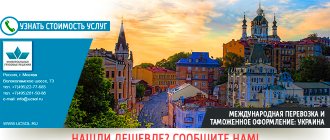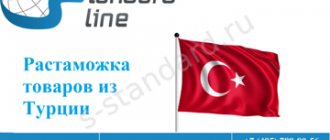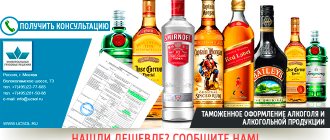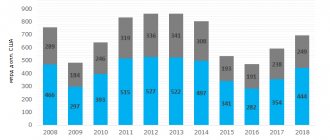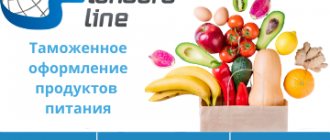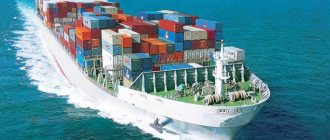Customs clearance
of alcohol is carried out in accordance with strict rules.
One of the main requirements is to mark products with excise stamps and pay excise duty, in addition to other mandatory customs duties. It is necessary to study in more detail the entire process and conditions for successful customs clearance of alcoholic beverages. ATTENTION! We work only with legal entities.
Customs payments
When importing alcoholic beverages into the territory of the Russian Federation, mandatory customs payments are collected: customs duty, excise duty and VAT. The VAT rate is constant - 20%, the amount of import duties and excise taxes differs under different conditions and depends on:
- countries of production;
- type of drink and its strength.
Payment rates are presented in the table:
| Name | Capacity | Product code | Duty | VAT | Excise tax |
| Malt beer | Up to 10 liters | 2203000100 – in bottles | 0.018 euro/l | 20% | 39 rub./l or 21 rub./l |
| 2203000900 – other | |||||
| More than 10 l | 2203001000 | 0.04 euro/l | 20% | 39 rub./l or 21 rub./l | |
| Grape must | – | 2204301000 | 5% | 20% | Without excise tax or 418 rub./l or 523 rub./l sp. |
| Strong alcoholic drinks such as cognac, whiskey | – | 2208201200 – for cognac, 2208301100 – for bourbon whiskey | 1.4 euro/l | 20% | 523 rub./l sp. or 418 rub./l sp. |
| Purified ethyl alcohol | – | 2207100000 | 100% or 2 euro/l | 20% | 107 rub./l sp. |
Restrictions on the import and export of alcohol
Only citizens who have reached the age of majority are allowed to transport alcoholic beverages across the customs border. Minors are not allowed to transport alcohol. The volume of alcoholic beverages that can be transported for personal use is established by law. Free, i.e. duty-free, you can transport up to 3 liters of drinks per person. When filling out a passenger customs declaration, you can import a larger volume, but not more than 5 liters, and 10 euros are charged for each liter over the duty-free 3 liters. If we are talking about ethyl alcohol, then for each imported liter you will have to pay 22 euros, the maximum volume is the same - 5 liters. If it turns out that the volume of alcohol is exceeded, a fine will be imposed or you will have to go through a simplified customs clearance procedure.
Note! The export of alcoholic beverages by individuals is not limited; you can export alcohol or spirits in any quantity.
Individual entrepreneurs, according to the law, do not have the right to import alcohol from abroad or export it abroad. This is permitted only to legal entities. Moreover, in order to legitimize commercial activity in this area, it is necessary:
- obtain a license;
- register with EGAIS;
- organize research of samples of alcoholic products;
- undergo certification and receive a declaration of conformity;
- receive excise stamps and label products;
- register alcohol upon import at customs;
- pay all due customs duties.
These points require clarification.
Licensing
. You need to obtain a license from Rosalkogolregulirovanie to import alcohol with an alcohol content of over 15%. For low-alcohol drinks, such as beer, an import license from the Federal Service for Alcohol Regulation is not required. The document is issued based on an application and a set of documents. The review period is 30 days, after which either a license is issued or a refusal is formulated. Requirements for issuing a license:
- authorized capital of at least 10 million rubles;
- payment of state duty - 800,000 rubles;
- the presence of a limited covered warehouse area, with the ability to maintain temperature and humidity conditions that meet the standards.
Registration in EGAIS
. It is mandatory for all persons who store and sell alcohol-containing products, regardless of the country of origin, type and percentage of alcohol. Information about each unit of production must be entered into the general federal database.
Certification
. Alcohol must comply with the following standards:
- TR CU 021/2011 “On food safety”;
- EAEU TR 047/2018 “On the safety of alcoholic products.”
Certification is carried out based on the results of a study of samples that are imported in advance, before the delivery of the main batch. Such qualities of drinks as sugar concentration, percentage of ethyl alcohol, sulfur dioxide concentration and others are studied.
Thus, a certificate of conformity or a declaration of conformity must be attached to imported alcoholic products. Labeling is also carried out, including the name of the product, composition, manufacturer’s data, expiration date and other information.
To certify alcohol, submit a package of documents:
- company registration certificate;
- information about the legal entity at whose request the certification procedure was organized;
- product information;
- a copy of the import agreement;
- samples for research in the laboratory.
Upon successful completion of certification, an excise stamp is applied to each unit of goods, confirming the legality of the imported alcohol. Excise stamps are purchased in advance, three months before the start of deliveries, and are issued by excise customs. The number of excise stamps must correspond to the number of units of imported goods. If as a result there are unused excise stamps left, the declarant must return them.
Who's making Russia drunk: the country's largest alcohol chains and their owners
Since 2021, alcohol markets have been included in the top 10 largest retail chains in Russia; our compatriots buy 12.3 billion liters of alcohol per year. Most of the profits from alcohol sales flow into the pockets of a few billionaires. Who controls Russian alcohol chains - in the FederalPress material.
"Red & White"
The network was founded in 2006 by Chelyabinsk businessman Sergei Studennikov , whose fortune today is estimated at $1.8 billion. As of September 1, 2021, the chain had 9,793 stores in 61 regions of the country. The company tries to keep prices low and often puts pressure on suppliers and landlords to extract better conditions. KB opens on average about a thousand stores a year.
The largest number of Krasnoe&Beloe stores are concentrated in the Moscow (575), Sverdlovsk (552) and Chelyabinsk (547) regions. These are so-called convenience stores, and there the consumer sees not only alcohol, but also a certain set of products. Prices for some items are even lower than in regular chain stores.
Such prices are a kind of marketing ploy so that the company can advertise products specifically with the help of leaflets - after all, alcohol advertising is prohibited in Russia. The company purchases all products in huge wholesale quantities. Add to this strict conditions for suppliers and we get some of the lowest prices on the market.
More on the topic
The doctor explained when alcohol combined with drugs leads to death
In the near future, the company will hold an IPO - an initial public offering of shares on the stock exchange, which will make Studennikov even richer. The company could be valued at $20 billion. We wrote more about Krasnoe&Bely and why the chain is closing its businesses en masse in its native Chelyabinsk region in this article.
At the beginning of 2021, the owners of the large food retailer Dixie and the alcoholic beverage chains Bristol and Krasnoe&Beloye announced a merger of the companies into a single business. In the combined business, Sergei Studennikov received 49%, the owners of Dixie and Bristol, Igor Kesaev and Sergei Katsiev , 51%. This event was preceded by searches in the KB network and billions of dollars in tax claims
According to marketing agency INFOLine, the network showed revenue growth by 26.4%, to 491 billion rubles. over the past year and now occupies almost half of the specialized market of the domestic wine trade.
"Bristol" and "Dixie"
It emerged in 1992 in Nizhny Novgorod as a tobacco wholesale trade enterprise. In 2002, businessmen Igor Kesaev and Sergei Katsiev bought Bristol on the initiative of its previous owners. At that time, the company controlled 60% of the Nizhny Novgorod tobacco market.
Now the chain belongs to the Mercury Group of Companies, which includes the Megapolis distribution group and the retail DIXY Group (Dixy, Victoria, Kvartal, Minimart chains). The fortune of Igor Kesaev is $4 billion, Sergei Katsiev’s is $1.7 billion, both are included in the ranking of “200 richest businessmen in Russia 2021” according to Forbes.
The Bristol chain has more than 2,500 stores in 30 regions of Russia. The most stores are in the Nizhny Novgorod region - 466, then the Moscow region - 210 stores and Tatarstan - 175.
Dixy has 2,333 stores in 36 regions. The leaders in the number of stores are Moscow (506) and the region (833), as well as St. Petersburg (303).
"VinLab"
The supermarket chain was founded in 2012. It is part of the BELUGA GROUP, the largest alcohol company in Russia, producing drinks at seven factories. The company was founded in Primorye. Their first asset is Ussuri Balsam, the largest Primorye alcohol producer. Now BELUGA GROUP owns the calling cards of Primorsky alcohol in the 2000s - the “Captain Rum” and “Antlers on Honey” liqueurs.
The network was founded in Vladivostok, but has now become federal. The company itself notes a wide offer of drinks in all popular categories as its main feature - the assortment includes more than 5 thousand items.
The business belongs to Primorye billionaire Alexander Mechetin. His fortune has not been assessed for a long time; the latest data dates back to 2011 - 5.7 billion rubles. In 2021, the businessman paid at least 900 thousand euros for Maltese citizenship.
Today, more than 800 stores are open under the VinLab brand in 11 regions of Russia. The key company's revenue for 2021, according to Seldon.Basis, amounted to 3.4 billion rubles.
More on the topic
Suppliers of champagne from France will return to Russia
According to INFOLine agency estimates, the retailer demonstrates the highest growth rates. According to the store itself, it has about 600 points of sale throughout the country, including Moscow, St. Petersburg and Nizhny Novgorod.
"Dylan"
The Dylan chain is trying to compete with VinLab in the Far East. But the number of its stores is much smaller - 109, and they are located mainly in the Far East. Most of the points are located in the Primorsky Territory, the rest are in the Khabarovsk Territory and the Jewish Autonomous Region. The company was the first in the Far Eastern region to develop the alcohol market format.
The chain's alcohol markets are aimed at buyers with average incomes, but at the same time offer an assortment for buyers with any income level. The group includes the retail network itself, a logistics complex and a distribution company. This reduces costs for everything not related to sales, which means the chain can charge lower prices.
Dylan is essentially a family business. The group is owned equally by brothers Agit and Rashid Shamoyan . Assad Shamoi is listed as the CEO of several companies in the group.
"Mavt" - "Magnum"
A chain of large stores selling premium alcohol. “Magnum” strives to provide high-quality service; the staff is carefully trained at the “Mavt” wine school: employees must be able to advise customers.
Since 1991, the chain has opened 69 stores in 11 cities of the Sverdlovsk, Kurgan, Chelyabinsk and Tyumen regions. From 2010 to 2021, the number of stores has risen and fallen continuously, remaining at 34 locations. The network has been growing over the past four years.
In 2021, Ekaterinburg entrepreneur Ilya Borzenkov sold the chain of Magnum alcohol markets that he owned to the founder of Chelyabinsk, Vyacheslav Safronov . Since then, in the Sverdlovsk region the chain has been called Magnum-Vinoteka.
"Fragrant World"
The Moscow network belongs to the Aroma Trade House. It is owned by Igor Balakirev (50%), Valery Zadorin (37.5%) and Pavel Zadorin (12.5%), indicates SPARK-Interfax. In 2021, revenue amounted to 8.2 billion rubles. The company supplies its products to international, federal and local supermarket chains.
At first, the company dealt only with imported alcohol and its sales. At the end of 2007, Aroma bought the Cognac House A. de Fussigny" in the French city of Cognac is one of the oldest cognac productions. So, along with imports, Aroma began producing its own alcohol.
The chain has 640 stores, most of which are in Moscow and the Moscow region (292), as well as in St. Petersburg and the Leningrad region (231).
"RosAl"
More on the topic
Aktiv Aristova launched beer production in the Krasnodar region
A chain of alcohol supermarkets, widespread in St. Petersburg and the Leningrad region. The company positions itself as convenience stores and claims low prices. The company has 134 stores and has been on the market for 6 years.
Until 2021, stores worked around the clock, selling alcohol at night as a bar. At the checkout, customers simply opened the bottle. Now the round-the-clock work has stopped.
"Vorilka"
The chain of alcohol stores was founded by Samara businessman Oleg Dergilev in 2005 and is part of his Gorilka holding. In 2013, he was killed: the criminals blackmailed Dergilev into selling them the alcohol business.
After Dergilev's death, his wife Anna owned almost the entire business. In 2021, the widow left the business, leaving management to the family of entrepreneur Alexander Kravchuk. The holding has more than 30 legal entities, more than 90% of each of which belongs to Kravchuk’s wife.
Now the chain has 440 stores, of which 70 are franchised. There are points in the Samara, Saratov and Orenburg regions.
"Lyon"
Perm network was founded in 2000 by businessman Sergei Trubin. There are 350 stores operating under the chain’s brand in the Perm region, Udmurtia and the Sverdlovsk region. The basis of the business is wholesale sales. The group of companies includes the Bereg supermarket chain.
The owner of the chain himself talks about his conservative approach to business. The company does not incur large debts and carefully selects new retail outlets and suppliers. This does not allow us to actively expand our geography and sales volumes.
"Extrasib"
The Novosibirsk network "Market" has been operating since 2002 and is controlled by the local trading house "Extrasib". Revenue for 2021 amounted to 1.3 billion rubles. The company is owned in equal shares by Grigory Bryukhanov and Igor Naimushin.
The chain has more than 700 stores, which are mostly located in Novosibirsk.
The sale of alcoholic beverages in most regions is prohibited from 11 pm to 8 am local time. After 11 p.m., alcohol can be sold in catering establishments that have specially equipped premises for visitors, and in duty-free areas at airports and border checkpoints. Accordingly, alcohol can be sold around the clock if you are immediately offered to drink it - by opening the cap of a factory bottle or pouring draft beer into a store container. Some alcohol stores indicate opening hours from 8 to 23, and from 23:01 to 7:59 a cafe with the same name is open.
Separately, we note that alcohol markets - without saying a word - keep prices low for the cheapest Russian-made beer. Its price practically does not change from region to region. Based on this, we created the so-called beer can index, which shows in which regions and how much alcohol can be bought for the average salary. The results are predictable - Muscovites can afford the largest amount of cheap alcohol in the country.
To compile the index, we chose the brand of the cheapest beer in Russia. FederalPress correspondents from different regions of the country visited alcohol stores and found the lowest price in the regional capital for half a liter of this drink. After that, we calculated how many liters of the cheapest beer you can buy for the average salary in the region.
Photo: FederalPress / Polina Zinovieva, Elena Mayorova
Customs clearance of alcohol
Note! Registration of alcoholic beverages is carried out at excise customs posts. The number of regional excise customs posts has recently decreased, so it is necessary to decide in advance where the products will be cleared.
Declaration of alcoholic products can be carried out by submitting an electronic customs declaration certified by an electronic digital signature. The declaration is submitted by the foreign trade participant or his representative. Customs clearance is carried out in the following order:
- The correctness of filling out documents is checked.
- A customs inspection is carried out (including the vehicle).
- Customs inspection involves a more thorough check, possibly opening the package.
- If no violations are found, the cargo is released for free circulation.
For imported alcoholic products, you must obtain and submit the following documents to the customs inspector:
- license from Rosalkogolregulirovaniya;
- certificate or declaration of conformity;
- excise stamps
- agreement with the seller;
- customs declaration;
- waybill;
- documents confirming payment of obligatory payments.
Note! In some cases, written permission from the copyright holder is required to import alcoholic beverages into the territory of the Russian Federation.
The excise stamp is pasted in such a way that its rupture leads to the opening of the bottle.
Certification of alcoholic products
Our company “Universal Freight Solutions” provides services for alcohol certification and labeling of alcoholic products.
Certification of alcoholic products is a mandatory condition for import or export from the customs territory of the Eurasian Economic Union. Customs clearance of alcohol involves its certification and labeling. The certificate confirms the quality of the product and its safety for human health. A document is issued on the basis of a test report issued by highly specialized laboratories that check the quality of imported products. Certification of alcoholic products means verification by authorized persons of the most important qualities of the product. So, in the case of wine products, this is the concentration of sugar, the proportion of ethyl alcohol, sulfur dioxide, etc.
The certificate of conformity is issued in the form of a declaration for alcohol. To obtain this document, you need to submit an application for certification to the certification body.
Additionally, customs clearance of alcoholic beverages requires passing a sanitary and epidemiological examination. It confirms product compliance with the standards of the Customs Union.
Certification of alcohol requires the provision of the following set of documents:
- Information about the product manufacturer (registration certificate and details);
- Information about the legal entity that signed the application for the certification procedure;
- Document on alcoholic products;
- Agreement for the import of products into Russia (copy);
- Samples of products for examination.
Important!
If a new type of alcohol is imported, you will need to obtain a registration certificate from Rospotrebnadzor. This document is required to complete the certification procedure.
All products that have passed certification are marked with excise stamps. This event is carried out in order to control the circulation of goods. A stamp is a government reporting document confirming the legality of imported alcohol.
In order to comply with legal requirements, customs clearance of alcohol involves the following customs control measures:
- Checking the accompanying documentation and declared information;
- Inspection of imported alcoholic products;
- Customs inspection of products.
We are ready to provide certificates (CC TR CU) and declarations of conformity of the Customs Union (DS TR CU) of the Technical Regulations of the Customs Union according to the new requirement of the Eurasian Economic Union (EAEU), test reports (PI), certificates of origin (ST-1, ST-2 or FORM A) and other permits necessary for the release by customs and subsequent sale of imported alcoholic products on the territory of the Russian Federation. Read more >>>
We also provide customs services at other customs houses (temporary storage warehouses) and cities of the Russian Federation!
Benefits of working with us
- We work 7 days a week 365 days a year
- Highly qualified specialists with extensive experience
- We bear full responsibility for the clearance of goods at customs
- We process any goods at any customs in Russia
Transportation methods
Transporting alcoholic beverages is fraught with risk because the liquid is in glass containers, which can be broken during transportation. Loading and unloading must be careful. Alcohol can be transported by any type of transport: by truck, in a container by train, by air or multimodal. Sometimes it is necessary to comply with certain temperature conditions, so isothermal vans and refrigerators can be used. In addition, alcohol can be delivered in bulk - by tanker truck.

